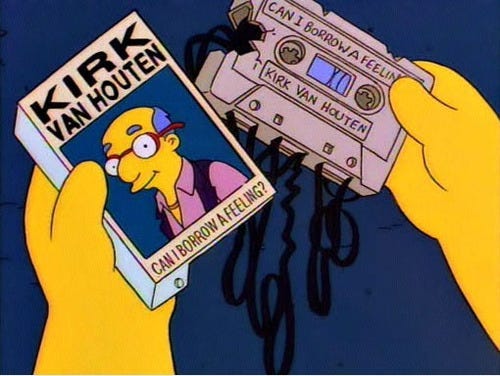You have impact. Your voice is important.
You don't need to be famous. Or rich.
I wrote this back in August, when I was preparing to give a talk that ultimately didn’t happen. What was supposed to be a straightforward talk, actually triggered a series of knock-on existential crises about the type of business owner (and person) I want to be.
And it wasn’t the type of person to give inauthentic, socially acceptable talks and sit through superficial conversations.
Yes, I left that group.
I have been sitting on this, because I figured that publishing it at the time would look like I was making a great man’s death all about me somehow. But, in being forced to write a talk I didn’t believe in, I ended up with several bits of writing that I wanted to share.
This is one of them. R.I.P. Mark.
Up until this morning, I had a different talk prepared. But yesterday, weirdly and randomly, my high school media teacher just popped into my head out of nowhere. I Googled him, as you do, only to find out that he died a few days ago. He was 54.
He was a veteran in the digital design space, and made me everything that I am.
I adored and admired him in a way that only a doe-eyed teenage girl with a super-embarrassing-in-retrospect crush can.
He was very polite about that, in retrospect.
It was 1992. He was super into digital design, and, naturally, because all I wanted to do was impress him… I was too.
25 years ago, almost to the day, he let me take the media room’s Macintosh Classic home for the holidays. He saw potential in me, and I think he knew I didn’t have a great home life, so he did that. There were a quite a few of us like that — kids he took under his wing and gently shielded from the harshness of high school.
With that Mac, I started to learn Photoshop. In black & white, no less…. I learned to digitally alter photos with the clone and smudge and blur alone — taken with a Black & White Quicktake camera. I also learned how to record music and make games, learned Hypercard, and later, as we progressed into fancy schmancy colour screens… HTML, Flash and Director.
I also learned how to build and run a radio station, which at the time was great fuel for my fragile (and yet raging) teenage ego.
And of course, like all teenagers in the 90s, I also used all of that to make myself a demo tape, but we don’t talk about that. Cringe.
As someone who always struggled to fit in, I found a space for myself both in the media room …and then, ultimately, online. I learned to wrangle spacer GIFs like a boss, on screens optimised for Internet Explorer and a 800×600 resolution. I gradually built influence and a voice and a brand through blogging and rode a weird wave with my favourite hobby.
There was no way this could ever be a real job, in my mind. They were just fun skills that I accumulated over time, which was probably why I never really tried that hard to monetise it (ooooh the opportunities I I squandered…). I did a different degree, and had different plans, but I still designed things, blogged, and somehow, over time, it became a real job.
What do you do, though?
I often get frustrated with the intangibility of what I do. Does it really matter if we produce websites? Or one of a million apps? Any idiot can with a smartphone can do what I do now for most people where ‘good enough’ is enough.
If I disappeared tomorrow, would what I contribute matter?
In reality, the answer is no.
I’ve pulled all-nighters for clients that never said thank you. I’ve given advice only to have it ignored, or worse, poorly executed.
I often feel like nothing I do matters.
I suppose you could ask the same thing about anything. What is the point? So many other people do what I do. But, like anything — and especially for my media teacher — it is not just about doing a job, but the difference you make to people while you do it.
He was just doing his job, too. But, upon finding out he’s gone, I’ll tell you now, it’s not the skills he taught me I remember.
It’s all the intangible things. It’s the things I didn’t appreciate as a teenager, but as an adult, have an overwhelming sense of appreciation for, because I understand how special and rare it is.
It was the care, the love, and the attention to detail with his work, that others didn’t notice or appreciate. It’s how to take pleasure in the thankless work — not because you get appreciation or money or even big wins, awards or praise, but simply because it helps others. How to be humble, which to this day, I definitely still struggle with.
It’s about how the internet is a gateway to so much more than a quick $27 or a dick pic. It provides a sense of belonging — a sanctuary (or rather it used to) — for those that are different.
You’re seeing me at another turning point I guess. Where I keep feeling pressure to conform, to ‘behave’, to try this and that and do it this way or that way (which, let’s be honest is code for “grow a dick and then we’ll take you seriously”)… when I do stuff my way.
My impact is in just doing my job and doing good work. Taking pleasure in the small wins and the small kindnesses and my small band of people who get it, and hanging out with the geeks in the media room, loving the shit out of computers, whilst all the mainstream and ordinary people go do their mainstream and ordinary things.
Remembering where I started helps to make me feel better and cement where we are going, and why. Being reminded of the enabler that digital tech is — no matter how poor, or sad, or lonely — there’s room for you, called the World Wide Web for you to achieve something great.
It’s easy to get distracted with all the stuff we should be doing. Or more significantly get frustrated over the stuff we haven’t done, or by comparing ourselves to the normal people.
But, remember, that everything you do has impact, even if you can’t really see it. Remember that investing in something, or someone, might not bear fruit for a while, if at all. Remember that, even though there are a lot of people just doing their job, there are others who go that extra mile, because they remember that humans are on the other side.
All this superficial bullshit that we buy into? It won’t matter, because we are all so vulnerable to the whims of life and death.
Good, kind, funny people die young every day. So do arseholes.
So, ask yourself again, how important is that scripted elevator pitch or conversation about the weather? Are you censoring yourself and others and policing how they express themselves? Are you treating people like crap just to make a sale or get ahead?
Or, are you doing good work that you would do even if nobody even noticed?
What is your impact? You’ll probably find it is more than you realise — for good and bad.
Originally published at kintsugi.com.au on February 18, 2019.




